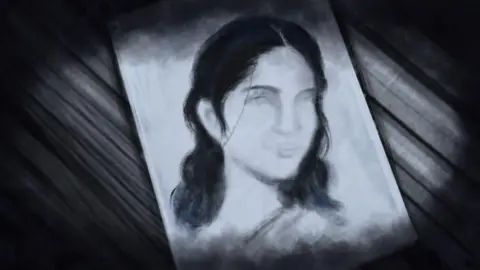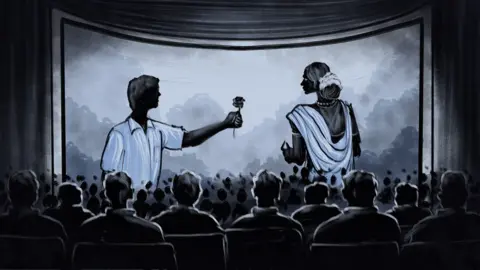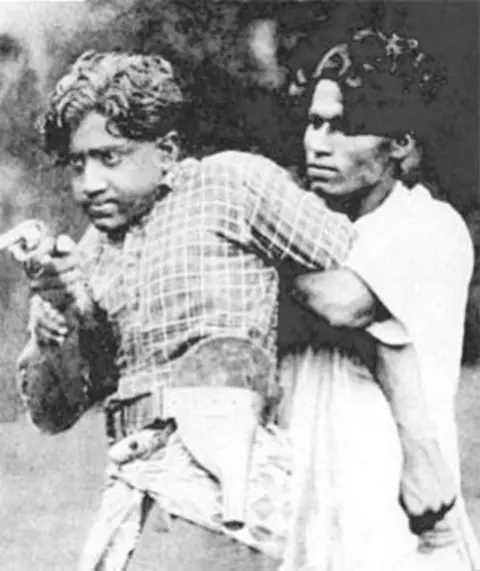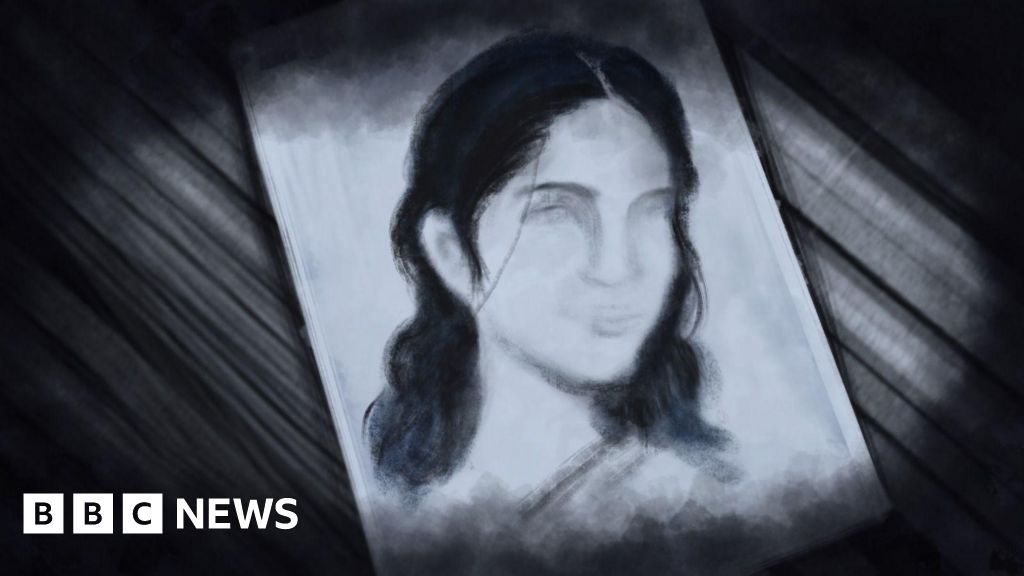[ad_1]
BBC India YouTube team
 Illustration by Puneet Kumar
Illustration by Puneet KumarAt a time when women’s participation in the film industry was frowned upon, a young woman dared to dream differently.
In 1920s pre-independence India, PK Rosy became the first female lead in Malayalam-language cinema, in what is now the southern state of Kerala.
She starred in a movie called Vigathakumaran, or The Lost Child, in the 1920s. But instead of being remembered as a pioneer, her story was buried – erased by caste discrimination and social backlash.
Rosy belonged to a lower-caste community and faced intense criticism for portraying an upper-caste woman in Vigathakumaran.
Almost a hundred years later, there is no surviving evidence of Rosy’s role. The film’s reel was destroyed and the cast and crew have all died.
Only a few pictures of the film from a contested press release dated October 1930 survive, along with an unverified black-and-white photo popularised by local newspapers as Rosy’s only portrait.
Even a Google Doodle celebrating her 120th birthday used an illustration similar to the woman in the photograph. But Rosy’s nephew and others who have researched her life told the BBC that they could not conclusively say that it is her in the picture.
PK Rosy was born as Rajamma in the early 1900s in the erstwhile kingdom of Travancore, now Kerala.
She belonged to a family of grass cutters from the Pulaya community, part of the Dalits, who are at the bottom of India’s harsh caste hierarchy and have been historically oppressed.
“People from the Pulaya community were considered slave labour and auctioned off with land,” says Malavika Binny, a professor of history at Kannur University.
“They were considered the ‘lowliest’. They were flogged, raped, tied to trees and set on fire for any so-called transgressions,” she adds.
Despite the dire social challenges, Rosy chose to dream differently.
 Illustration by Puneet Kumar
Illustration by Puneet KumarShe was supported by her uncle, who was a theatre artist himself, and with his help Rosy entered the field of entertainment.
“There are few available facts about Rosy’s life, but it is known that she was popular for her performances in local plays,” says Vinu Abraham, the author of The Lost Heroine, a novel based on Rosy’s life.
While her acting skills earned admiration, it was rare for a Dalit woman to take up acting at the time.
“She was likely aware of the fact that this was a new arena and making herself visible was important,” says Prof Binny.
She soon became a well-known figure in local theatre circles and her talent caught the eye of director JC Daniel, who was then searching for a lead actor for his film – a character named Sarojini.
Daniel was aware of Rosy’s caste identity and chose to cast her in the role.
“She was paid five rupees a day for 10 days of filming,” said Mr Abraham. “This was a substantial amount of money in the 1920s.”
On the day of the film’s premiere, Rosy and her family were barred from attending the screening.
They were stopped because they were Dalits, Rosy’s nephew Biju Govindan says.
And so began a chain of events that pushed Rosy out of the public eye and her home.
“The crowd that came to watch the movie were provoked by two things: Rosy playing an upper-caste woman and the hero picking a flower from her hair and kissing it in one scene,” said Mr Abraham.
“They started throwing rocks at the screen and chased Daniel away,” he added.
There are differing accounts of the extent of the damage to the theatre but what is clear is the toll the incident took on both Rosy and Daniel.
 Poster of the movie Vigathakumaran
Poster of the movie VigathakumaranDaniel had spent a lot of money to establish a studio and gather resources to produce the film, and was heavily debt-ridden. Facing immense social and financial pressure, the director, who is now widely regarded as the father of Malayalam cinema, never made another film.
Rosy fled her hometown after an angry mob set her house on fire.
She cut all ties with her family to avoid being recognised and never spoke publicly about her past. She rebuilt her life by marrying an upper-caste man and took the name Rajammal.
She lived the rest of her life in obscurity in the town of Nagercoil in Tamil Nadu, Mr Abraham says.
Her children refused to accept that PK Rosy, the Dalit actor, was their mother, Rosy’s nephew Mr Govindan says.
“Her children were born with an upper-caste Kesavan Pillai’s identity. They chose their father’s seed over their mother’s womb,” he says.
“We, her family, are part of PK Rosy’s Dalit identity before the film’s release,” he said.
“In the space they inhabit, caste restricts them from accepting their Dalit heritage. That is their reality and our family has no place in it.”
In 2013, a Malayalam TV channel tracked down Rosy’s daughter Padma, who was living in financial strain somewhere in Tamil Nadu. She told them that she did not know much about her mother’s life before her marriage but that she did not act after that.
The BBC made attempts to contact Rosy’s children, but their relatives said they were not comfortable with the attention.
Prof Binny says that the erasure of Rosy’s legacy shows how deeply caste-based trauma can run.
“It can be so intense that it shapes or defines the rest of one’s life,” she says, adding that she is glad Rosy eventually found a safe space.
In recent years, Dalit filmmakers and activists have sought to reclaim Rosy’s legacy. Influential Tamil director Pa Ranjith has launched a yearly film festival in her name which celebrates Dalit cinema. A film society and foundation have also been established.
But there is still a haunting sense that while Rosy was ultimately saved, it was at the cost of her passion and identity.
“Rosy prioritised survival over art and, as a result, never tried to speak publicly or reclaim her lost identity. That’s not her failure – it’s society’s,” says Mr Govindan.
Follow BBC News India on Instagram, YouTube, Twitter and Facebook.
[ad_2]
Source link




